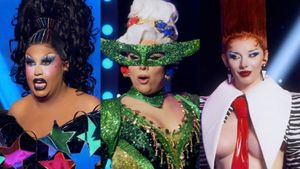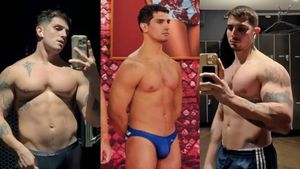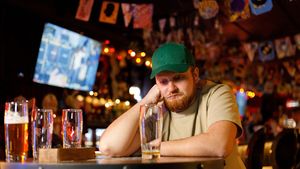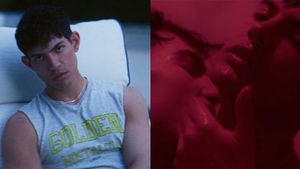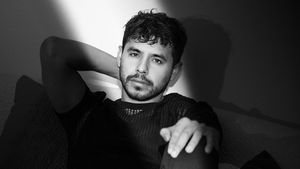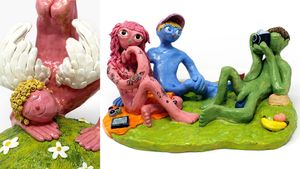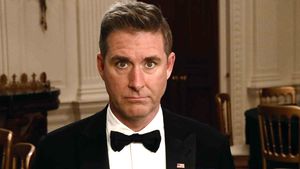Filmmaker Sebastián Silva (Tyrel, Crystal Fairy & the Magical Cactus, Nasty Baby) turned heads at the 2023 Sundance Film Festival with his new film, Rotting in the Sun, which features Silva, along with actor Jordan Firstman, playing fictional versions of themselves.
On one hand, Rotting in the Sun is a hilarious satire about gay men who love to party and have an obsession with social media. At the same time, the film is also a missing-body thriller that literally keeps you on the edge of your seat. Altogether, this raw and envelope-pushing project dares to hold up a mirror to gay men and show some of their funnest, funniest, and darkest reflections.
During an interview with PRIDE, Firstman looks back on the many naked scenes he shot for Rotting in the Sun and how those scenes helped him get much more comfortable with his own body image. Moreover, the actor reveals the true story behind meeting Silva and how they got to work together in the film – which had similarities to the plot of the movie but wasn’t entirely the same. Last but not least, Firstman reflects on the pressures of representing gay men on the big screen, and how Rotting in the Sun takes a completely different approach than other projects.
Scroll through to read PRIDE’s full interview with Jordan Firstman – and make sure to watch him in Rotting in the Sun now in theaters.
PRIDE: There’s been a story circulating that, much like in Rotting in the Sun, you approached Sebastián Silva about making a project together. Is that true?
Jordan Firstman: I did not! I think that's maybe because there are parts of reality and parts of fiction in the movie. I had watched his movie the night before I met him, and then I ran into him really randomly. But I didn't ask him to work together at all.
In fact, we had a dinner and we really didn't connect that much. He thought I was pretty annoying and I thought he was kind of pretentious. So, I thought that was going to be that. I was like, ‘Okay, well, I like his films, that's enough.’ And then a month later he called me… I think he was inspired by parts of my personality that he thought were disgusting, but he wanted to work with me based on my shortcomings.
What was it like working with Sebastián on this movie, not only as your co-star but also as your director?
It was a journey. It was super chaotic at times. It was tense at times. It was loving at times. But it ended with a lot of love. When you make a movie, the process, it's not just that month that you're shooting it. You have time in prep, and then the journey really starts way after you shoot the movie. So in editing the movie, I was around.
And then once we got into Sundance, you start doing press together and traveling together. Our relationship has developed a lot and we're really, really close. Spiritually, we're meant to be in each other's lives. We don't always get along, but that makes it fun too. There's always this tension that we can fight at any time.
So we actually have this well-documented evolution of your friendship as the two of you shot the film and then started to do press together. I think that’s actually fascinating.
Yeah. I mean, there are definitely people out there that have to do these press tours with people they hate. They have the worst time working and they might also hate the movie, but they're contractually obligated to do it. We're lucky we both love the movie and we do have a lot of love for each other, but it's taken time.
I love this movie. I think it’s really funny, but it’s also a thriller, and it’s also a satire about gay men. How did you tackle making a movie like this?
The second I started to overthink what it was saying about me or my community, I would've gotten too in my head. So while we were shooting, I just really tried to focus on the scenes. There's a major plot in the movie, so focusing on the more tactical aspects of the writing was really the way to go.
Then, in the edit, I think a lot comes together in theme and tone. When I watched the movie, a lot of things played so differently than I thought. When I read the script, him doing ketamine by himself at 11 a.m. reads as a joke. But then you see him doing it and you're like, 'Oh, damn, that's sad.' Things that seem funny on the page were way darker in the film. Things that seem darker on the page are way funnier in the movie. So yeah, my thoughts about the whole thing have changed since I've been able to see the film a few times.
I'm always interested in this conversation because we’ve seen so many projects trying to depict gay men, like Fire Island, Bros, the Looking television show. There’s always this tension about audiences being like, ‘That’s too gay’ or ‘That’s not gay enough.’ It’s always interesting to me how filmmakers and actors tackle this specific kind of queer representation.
What's lucky and cool about Sebastián is he did not want to make something that was about gay people for straight people. He also didn't care about gay people at all. He doesn't care if they like this, if they watch it at all… he actually prefers that they don't, probably. So in doing that, it does make for a thing that's completely not self-conscious and could just show the reality.
I think I care way more about how it's perceived within the community. I was nervous because I may or may not be somewhat of a divisive figure within the community. I think most of my ‘haters,’ especially online, are gay guys. But the gay response has been amazing. I do feel like they've never seen such a close depiction to reality in anything they've seen, and I think that is because it's not trying to be for gay people, and it's also not trying to be for straight people. [The film is] just making observations of what we've seen in real life, and observations about me and my life, and put them into a story that is about 20 other things too.
Has the response to Rotting in the Sun changed from when it first premiered at Sundance to now that more people are watching it?
Definitely. Because the movie is about a lot of things, it takes a little bit of time to marinate and process and sink in. At Sundance, you have these audiences that we screened on a Sunday night at 10 p.m. They had all seen six movies that day, and then we were going right to our after party and everyone's doing cocaine and forgot about it immediately. So yeah, I think it's better as a one-off thing because then you get to actually sit with it and be like, 'Whoa.' And some people are like, 'That was so funny and sharp and satirical.'
For other audiences, it's really heavy for them. A lot of people talk to Sebastián about the movie's depiction of suicide and suicidal thoughts. It's heavy for some people, but they also feel represented.
There’s a lot of nudity in the movie. A lot of penises and a lot of asses. What was it like to film those scenes – specifically at the beach – with so many people involved on set?
We got lucky because the scene was already there. We shot it at a nude beach. Everyone there, there's this immense sense of freedom. It's the least body-shame-y gay place I've ever been to in my life. When I first started going there, I would not get naked. As Americans, we're just so ashamed of things.
It was a very powerful exercise, for me especially, because I don't particularly love my body. I can't say I'm the biggest fan. So putting it all out there for not just people on the beach to see, but everyone [watching the film], it was a powerful exercise. I am so much more comfortable with my body now. There are no secrets. They know what my dick looks like. They know I have some fat around my belly. They see every inch of it, so it was cool.
Martin, who's in the movie, and Sebastián, we were just talking about the movie the other day and they were like, 'Oh my god, you were so scared of being fat the entire movie.' I was like, 'I was? I don't remember that. I remember being this freeing experience,' Apparently, I was super self-conscious when we were shooting. But yeah, it definitely helped me get more comfortable with my own body.
But to answer more of your question, that stuff was super fun. You're already horny because you're there and you're around all these dicks and everyone's already fucking. So I mean, the orgy scene in Mexico City was a lot harder because I wasn't feeling sexy and desirable there. And it was just grimier, like the apartment, and there was also a lot of plot in that scene: I had to get the phone, move a lot, stay hard, and just keep violently masturbating when they called cut to try to stay hard. So there were some really fun parts and some really, really hard parts… and not everything as hard as I would've liked it to be.
There are many messages in this movie. Do you have an ideal response, or a storyline you’re most proud of, that you’d like audiences to walk away with after watching Rotting in the Sun?
I think it's more the style of filmmaking that I hope people appreciate and want to see more of. It truly is artistic, and what Sebastián was able to do with fiction feels very modern to me.
There's no hiding anymore in the culture we live in, so when you see a movie and it feels fake, it's just not enough anymore. His way of doing that, and I don't think it was even purposeful, he is just a true artist. Taking these real parts of his life and elevating them to make statements or to make a good story is just a really cool thing. I hope people appreciate the craft of it and don't see it as a lazy thing to use your life. [I hope they] see it as something that is digging deeper and making art out of what's around you.




































































